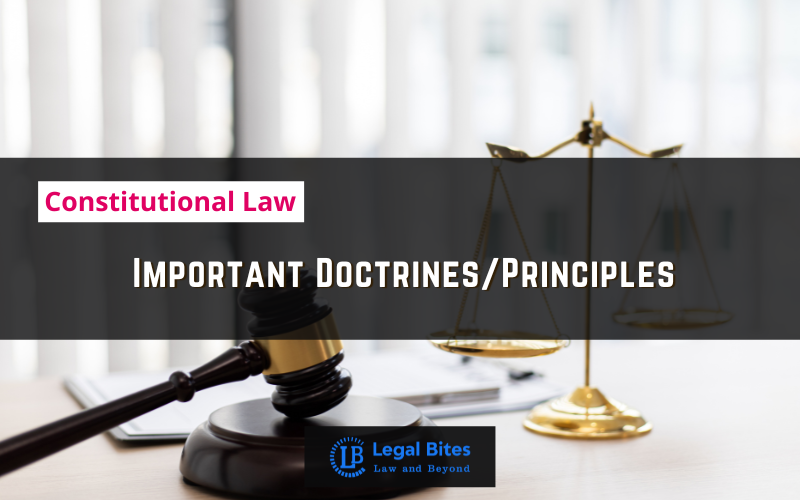State the legislative power of Union and State? Under what circumstances Union can legislate on matters pertaining to State List?
Question: State the legislative power of Union and State? Under what circumstances Union can legislate on matters pertaining to State List? [MPJS 2017] Find the answer to the mains question only on Legal Bites. [State the legislative power of Union and State? Under what circumstances Union can legislate on matters pertaining to State List?] Answer The main characteristic… Read More »
;
Question: State the legislative power of Union and State? Under what circumstances Union can legislate on matters pertaining to State List? [MPJS 2017] Find the answer to the mains question only on Legal Bites. [State the legislative power of Union and State? Under what circumstances Union can legislate on matters pertaining to State List?] Answer The main characteristic of a federal Constitution is the distribution of powers between the Centre and the States. The legislative powers are...
Question: State the legislative power of Union and State? Under what circumstances Union can legislate on matters pertaining to State List? [MPJS 2017]
Find the answer to the mains question only on Legal Bites. [State the legislative power of Union and State? Under what circumstances Union can legislate on matters pertaining to State List?]
Answer
The main characteristic of a federal Constitution is the distribution of powers between the Centre and the States. The legislative powers are subject to the scheme of distribution of powers between the Union and State Legislatures as provided in three lists under the Constitution, fundamental rights, and other provisions of the Constitution (Arts. 245-254). The Constitution makes a two-fold distribution of legislative powers:
- With respect to the territory.
- With respect to the subject matter of legislation, (i.e. three Lists).
The distribution of territorial jurisdiction between Union and State entails under Article 254 and Article 245 respectively. Article 254 (1) of the Constitution says that Parliament may make laws for the whole or any part of the territory of India. Article 254 (2) provides that a law made by Parliament shall not be invalid merely on the ground that it would have extra-territorial operation.
Further, Article 245(1) states that the State Legislature may make laws for the whole or any part of the State. In other words, the State legislature is not empowered to make such laws having extra-territorial operation i.e. a state law would be void if it has operated outside the concerned state. The question of whether there is sufficient territorial nexus will be determined according to the facts and circumstances of each case by courts.
In, State of Bombay v. RMDC [AIR 1957 SC 699], the state of Bombay levied a tax on lotteries and prize competitions which was extended to the newspapers published outside the state but having lump sum circulation of newspaper in the state. The respondent organized a prize competition through a newspaper printed and published in Bangalore but had wide circulation in Bombay. The court held that there is sufficient territorial nexus between the person charged and the state seeking tax. Therefore the taxing statute could not be struck down on the ground of extra-territoriality.
Moreover, the three lists that related to subject-matter jurisdiction of the Union and States are:
- Union list:-This list includes subjects of national importance like defense, banking, etc. Only union govt. can legislate on these subjects.
- State list: – This list includes subjects of regional importance like irrigation, trade, etc. Only state govt. can legislate on these subjects.
- Concurrent list: – This list included subjects of common importance such as marriage, succession. Both governments can legislate. If there is conflict decision of union govt. prevails.
Notably, Parliament is empowered under Articles 249 to 253 to encroach on the fields which are meant exclusively for State legislation, though it is subject to certain conditions being satisfied.
- When Rajya Sabha passes a resolution with the support of a special majority (members present and voting) declaring that the subject is of national interest. (Article 249)
- During times of national Emergency, Parliament is empowered to legislate on all subjects mentioned in any list. (Article 250)
- Power to legislate can be vested in Parliament if 2 or more state passes a resolution authorizing parliament to make law for an item in the State list. (Article 252)
- For the implementation of treaties or decisions made in an international conference. (Article 253)
- During the president’s rule. (Article 350)
The rationale behind such distribution of powers in India between Union and State is that a strong Centre is essential to coordinate the activities of various states in the interest of uniformity to preserve national unity and integrity.
Important Mains Questions Series for Judiciary, APO & University Exams
- Constitutional Law Mains Questions Series Part-I
- Constitutional Law Mains Questions Series Part-I
- Constitutional Law Mains Questions Series Part-II
- Constitutional Law Mains Questions Series Part-IV
- Constitutional Law Mains Questions Series Part-V
- Constitutional Law Mains Questions Series Part-VI
- Constitutional Law Mains Questions Series Part-VII
- Constitutional Law Mains Questions Series Part-VIII
- Constitutional Law Mains Questions Series Part-IX
- Constitutional Law Mains Questions Series Part-X



